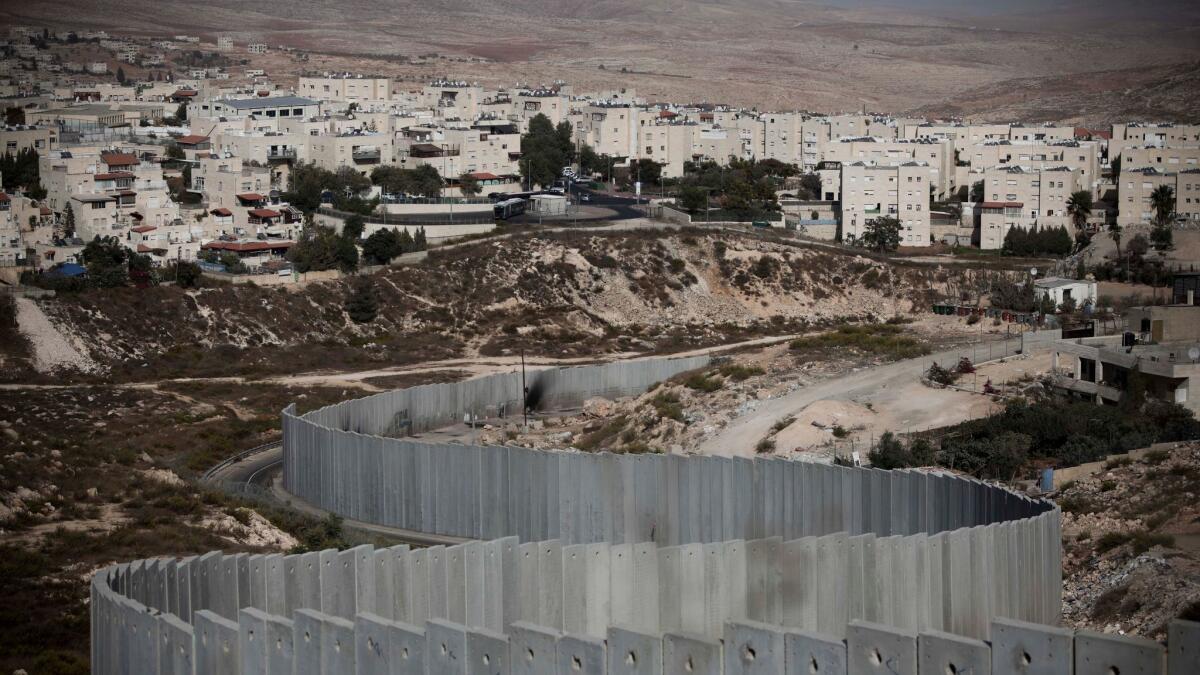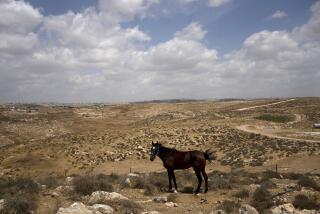Op-Ed: Jewish and Palestinian peace activists are building their own Standing Rock on the West Bank

In the 50 years since Israel occupied the West Bank, in June 1967, Palestinians have tried myriad strategies to end foreign military rule without success. They have sought freedom through violent and peaceful means, including years spent talking to reluctant Israeli officials. Yet Palestinian activists have found a productive way forward: They are joining forces with outsiders, including sympathetic Israelis and diaspora Jews, to form strategic nonviolent alliances.
Traditionally, Israeli peace groups have limited their activities to Israel proper, holding rallies in opposition to government policies in the comfort of Tel Aviv. Rarely have they crossed the green line to show true solidarity with Palestinians. And those Israeli peaceniks who did cross over did so only for a short protest or meeting, at the end of which they returned home.
A breakthrough occurred recently when a coalition of five Palestinian, Israeli and Jewish diaspora groups, inspired by the Standing Rock protests in the United States, created Sumud Freedom Camp in the West Bank village of Sarura, in South Hebron.
The area is under full control of the Israeli military. Its Palestinian residents live in fear of violence from soldiers and Israeli settlers alike and are under constant pressure to leave the area so Israel can appropriate the land.
The point of the camp is to draw attention to this problem, reclaim the land for Palestinians and rehabilitate the village, which is in disrepair.
The point of the camp is to draw attention to this problem, reclaim the land for Palestinians and rehabilitate the village, which is in disrepair. It’s an act of radical civil disobedience through continuous presence.
Participants in this campaign, which began May 18 and continues to this day, vowed to stay put even if the Israeli army tried to remove them physically. Three times in the first 12 days, Israeli troops raided the camp and confiscated tents, sound equipment and even a car belonging to a local Palestinian. But no one was arrested. The coalition resisted nonviolently and after every army incursion they rebuilt their tents.
If Palestinians alone had built Sumud, it would no doubt have been dismantled by now. But the presence of Israelis and diaspora Jews confers a measure of security. The camp survives due to solidarity, and local Palestinians are grateful. They’ve begun making daily visits to bring food, and many broke the Ramadan fast with their new comrades.
Sumud, which means “steadfastness” in Arabic, is actually one of several examples of a nonviolent alliance between Palestinians and Jews, who are bonding together to support the inalienable right of Palestinians to live in their homes and on their land independent of military occupiers.
On May 16, after the group Jewish Voices for Peace and Palestinian rights activists realized that the cash payment giant PayPal had excluded Palestinians from using its service — while including Israelis and Israeli settlers — they staged a demonstration outside the company’s San Jose headquarters. They also circulated a petition that was eventually signed by 180,000 people around the world.
Another example is the weekly Friday protests against the Israeli-built security wall inside Palestinian areas. Israeli peace supporters have joined in these protests, which have succeeded in shifting the path of the wall in a number of locations.
The alliance between Palestinians and supportive Jews is reminiscent of the period in the U.S. civil rights movement when white activists actually traveled to the South to join forces with black activists, instead of simply voicing their displeasure from far away.
While these efforts at alliance might be limited in nature and scope, they may represent the most effective way yet for Palestinians to regain their national rights.
Daoud Kuttab is a Palestinian journalist and former professor of journalism at Princeton University. He is a columnist with Al-Monitor. Follow him on Twitter @daoudkuttab
Follow the Opinion section on Twitter @latimesopinion or Facebook
More to Read
A cure for the common opinion
Get thought-provoking perspectives with our weekly newsletter.
You may occasionally receive promotional content from the Los Angeles Times.










